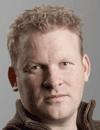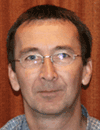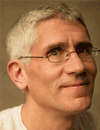Edwin Cuppen
Professor, University Medical Center UtrechtEdwin Cuppen (1970) obtained his masters in molecular sciences at the Agricultural University Wageningen in 1994 (cum laude) and his PhD degree with research on signal transduction in 1999 at the Radboud University in Nijmegen in the group of Prof. Be Wieringa.During his education, he spent half a year in het Jaenish lab at the Whitehead Institute in Boston. From 1999 to 2002 he performed postdoctoral research on C.elegans genomics at the Netherlands Cancer Institute in Amsterdam and the Hubrecht Institute in Utrecht, The Netherlands, in the group of Prof. Ronald Plasterk. In 2002 he started his own research group at the Hubrecht Institute on rat genetics and genomics and in 2007 he was appointed professor of Genome Biology at the Biology department of the Utrecht University. In 2009 he was appointed professor of Human Genetics and head of the research section of the Medical Genetics department of the University Medical Center Utrecht, while continuing his work at the Hubrecht Institute.
His area of expertise is in genomics and genetics and his scientific interests are in functional and personal genomics. In 2005, Edwin Cuppen was awarded a prestigious European Young Investigators Award for his work on naturally occurring and induced genetic variation in the laboratory rat. He was one of the first to generate gene knockout models in the rat and also showed the widespread effect of copy number variation on gene expression levels.
In his current work he combines experimental methods, including next-generation sequencing technology and animal model studies, with bioinformatic approaches to identify functional elements in genomes and to understand the effects of genetic variation under normal and disease conditions.?His research group has a long track record in high-throughput DNA analysis and was the first in Europe to implement AB’s next-generation sequencing technology SOLiD. This platform is now used for genome sequencing and mutation detection/discovery, but also for (small) RNA sequencing, ChIP-Seq, and structural variation detection. Currently, programs are set up to implement next-generation sequencing approaches for diagnostic purposes in clinical genetics and personalized cancer treatment. The group has a variety of academic and non-academic collaborations for the development and scaling of next-generation sequencing applications as well as future single molecule sequencing.
Edwin Cuppen is inventor on various patents and cofounder and CSO of the biotech startup company InteRNA Technologies that focuses on miRNA-based diagnostics and therapeutics. He is also cofounder of InteRNA Genomics that provides bioinformatic services for the analysis of next-generation sequencing data, including small RNA discovery and profiling.
|  | | | Ewen Kirkness
Professor, The J Craig Venter InstituteEwen Kirkness is an Investigator in the Genomic Medicine group at JCVI. Dr Kirkness has acquired substantial experience in the production and analysis of genome-wide datasets, from early work on large-scale human EST production, to more recent analyses of genome assemblies and RNA expression. He has applied a variety of DNA capture technologies for targeted sequencing of the human genome. His ongoing research projects are focused on structural aspects of the human genome, including structural variation, long-range haplotyping, and allele-specific gene expression. |  | | | Corey Nislow
Associate Professor, University of British ColumbiaCorey Nislow received his Ph.D. from the University of Colorado, working with Dr. J. Richard McIntosh where they uncovered the first human mitotic kinesin. Dr. Nislow was an American Cancer Society Postdoctoral Fellow working with Dr. Lorraine Pillus on transcriptional silencing. After several years in the biotech sector, Dr. Nislow joined the Stanford Genome Technology Center, developing automated parallel phenotypic assays. At the University of Toronto since 2006, Dr. Nislow has pioneered microarray and sequence-based platforms to understand chemical genomic interactions and chromatin architecture. He is director of the Donnelly Sequencing Centre at the University of Toronto |  | | |
|

 Add to Calendar ▼2012-04-19 00:00:002012-04-20 00:00:00Europe/LondonNext-Gen SequencingSELECTBIOenquiries@selectbiosciences.com
Add to Calendar ▼2012-04-19 00:00:002012-04-20 00:00:00Europe/LondonNext-Gen SequencingSELECTBIOenquiries@selectbiosciences.com